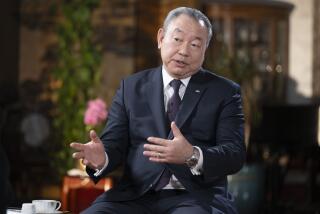Chinese Premier Talks of ‘Bonds’ to Woo Taiwan
- Share via
BEIJING — Chinese Premier Wen Jiabao reached out to the people of Taiwan on Sunday, using an emotional appeal rather than the threat of force to underscore his government’s vision of reunification.
“There is only one China in this world. The strait that separates us can never cut off the bonds that tie us by flesh and blood,” Wen said during his news conference after the end of China’s legislative session. He then quoted a line by a Taiwanese poet: “Only when the blood of the native son flows back to its native place will it stop boiling.”
The premier made his remarks less than a week before Taiwan’s citizens vote in a presidential election and a referendum that Beijing sees as a push for independence.
Chinese Nationalists led by Chiang Kai-shek fled to Taiwan after losing a civil war to the Communists in the late 1940s. Beijing has promised to use force, if necessary, to take the island back. But Wen toned down the rhetoric and appealed instead to the hearts of the Taiwanese people. Analysts say that’s because past threats have backfired and strengthened pro-independence sentiment.
“Four years ago, Premier Zhu Rongji pointed his finger at Taiwan and said China would launch war if it declares independence. The result was counterproductive. More people voted for Chen Shui-bian,” said Cheng Li, a China expert at Hamilton College in upstate New York, referring to Taiwan’s president, who is up for reelection Saturday.
“Wen Jiabao did not emphasize war but rather maintaining peace and the status quo,” Li said. “He used his words very carefully.”
But the Chinese premier accused Taiwan’s president of raising cross-strait tensions for political gain. “The Taiwan authorities have been trying to push for a referendum aimed at Taiwan independence under the pretext of democracy,” Wen said. “What they have been doing has undermined the one-China principle universally recognized by the world and posed a threat to stability in the Taiwan Strait.”
A senior Taiwanese official dismissed Wen’s message as nothing new.
“It’s their standard reaction,” said Tsai Ing-wen, chairwoman of the Mainland Affairs Council. “It shows that at this stage, there is still a certain degree of stiffness about their thinking about cross-strait issues. Maybe after our election they can have a better understanding of our democratic society.”
Taiwan’s referendum, to be held at the same time as the presidential election, is cast as a vote on the mainland’s missile buildup across from the island.
Responding to a Chinese reporter about prospects for political reform, Wen said he wanted to focus on strengthening the rule of law, accountability and collective decision-making, but he offered few specifics.
This year’s National People’s Congress, which ended Sunday, ratified dramatic changes to the constitution that enable entrepreneurs to join the Communist Party and protect private property and human rights.
For critics, these changes are merely semantic. At least one man has been testing whether Beijing is listening.
Jiang Yanyong, a military doctor who became a kind of national hero last year for exposing Beijing’s initial cover-up of the SARS epidemic, wrote a letter at the beginning of this legislative session asking officials to reverse their verdict on the 1989 demonstrations at Tiananmen Square. Beijing still considers the episode a counterrevolutionary rebellion.
The 72-year-old surgeon, who said he treated more than 80 people who were wounded in the crackdown, asked officials to recast their view of it and regard it as a patriotic movement.
Wen did not budge on the issue. Instead, he referred to the student movement as a “political disturbance” that occurred in the last century.
“What hung in the balance was the future of our party and our country,” Wen said at the news conference. “We successfully stabilized the situation of reform and opened up the path of building socialism with Chinese characteristics. These achievements are self-evident for all. Unity and stability are more important than anything else.”
More to Read
Sign up for Essential California
The most important California stories and recommendations in your inbox every morning.
You may occasionally receive promotional content from the Los Angeles Times.










